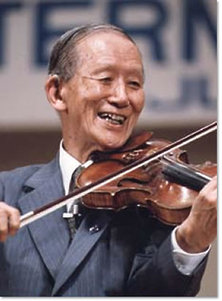Why Choose Suzuki Violin?

Dr. Shinichi Suzuki
Suzuki violin is a unique and exciting experience for your child. All learning in the early years is without printed music, often called the “mother-tongue” approach. Children learn by listening and using small steps, and memory is developed in a gradual manner until it becomes a high skill. Young children have an almost uncanny ability to work in this manner, the "natural" manner of language learning. The ideas of parent responsibility, loving encouragement, constant repetition, etc., are some of the special features of the Suzuki approach.
Suzuki students have discipline and perseverance, strong bonds with their parents, are confident in front of a group, have good stage presence, are well-rounded individuals, appreciate music in the world, and make lasting friendships.
Suzuki students have discipline and perseverance, strong bonds with their parents, are confident in front of a group, have good stage presence, are well-rounded individuals, appreciate music in the world, and make lasting friendships.
Parental Involvement
In Suzuki music studies, teachers often refer to the “Suzuki Triangle.” It is my personal belief that the implementation of the Suzuki Triangle is what makes the Suzuki method so fun and effective. The three points on the "triangle" represent a different person involved in Suzuki lessons: the student, the parent, and the teacher. All three people are connected in this triangle, with the student always placed at the top. Parents attend all private and group lessons with their child, learn as the child learns, and practice with their child at home. Parental involvement helps to promote consistency and efficiency in practice and offers the sharing of quality time together with mutual tasks and goals.
Encouragement
As with learning to speak, the child’s efforts to learn an instrument should be met with sincere praise and encouragement. Each child learns at his/her own rate, building on small steps so that each one can be mastered. Children are also encouraged to support each other’s efforts, fostering an attitude of generosity and cooperation.
Listening
Young musicians learn best when they hear a piece of music and play it back, similarly to learning a language. We begin reading words after we can speak the language, and Suzuki students begin reading music after they can play fluently on the violin. Listening is a critical part of the Suzuki method, and students who are dedicated listeners have improved pitch, tone, and confidence in their playing. Suzuki violinists also show an increase in memory that helps with all of life’s skills as they grow.
Repetition
Constant repetition is essential in learning to play an instrument. Children do not learn a piece of music and then discard it. They add it to their vocabulary or repertoire, gradually using it in new and more sophisticated ways.
Group Lessons
In addition to weekly private lessons, you and your child will have the opportunity to attend group lessons with other students of similar ability levels. In group lessons, students will review music vocabulary, refine skills, work and play together, and develop ensemble and leadership skills. It is a unique and fun aspect of the Suzuki method and a great motivator for young musicians.
The Suzuki Legacy
Shinichi Suzuki was a violinist, educator, philosopher and humanitarian. Born in 1898, he studied violin in Japan for some years before going to Germany in the 1920s for further study. After the end of World War II, Dr. Suzuki devoted his life to the development of the method he calls Talent Education.
Suzuki based his approach on the belief that “Musical ability is not an inborn talent but an ability which can be developed. Any child who is properly trained can develop musical ability, just as all children develop the ability to speak their mother tongue. The potential of every child is unlimited.”
Dr. Suzuki’s goal was not simply to develop professional musicians, but to nurture loving human beings and help develop each child’s character through the study of music.
Suzuki based his approach on the belief that “Musical ability is not an inborn talent but an ability which can be developed. Any child who is properly trained can develop musical ability, just as all children develop the ability to speak their mother tongue. The potential of every child is unlimited.”
Dr. Suzuki’s goal was not simply to develop professional musicians, but to nurture loving human beings and help develop each child’s character through the study of music.
Sources: Lisa Deakins and SAA Suzuki Twinkler
